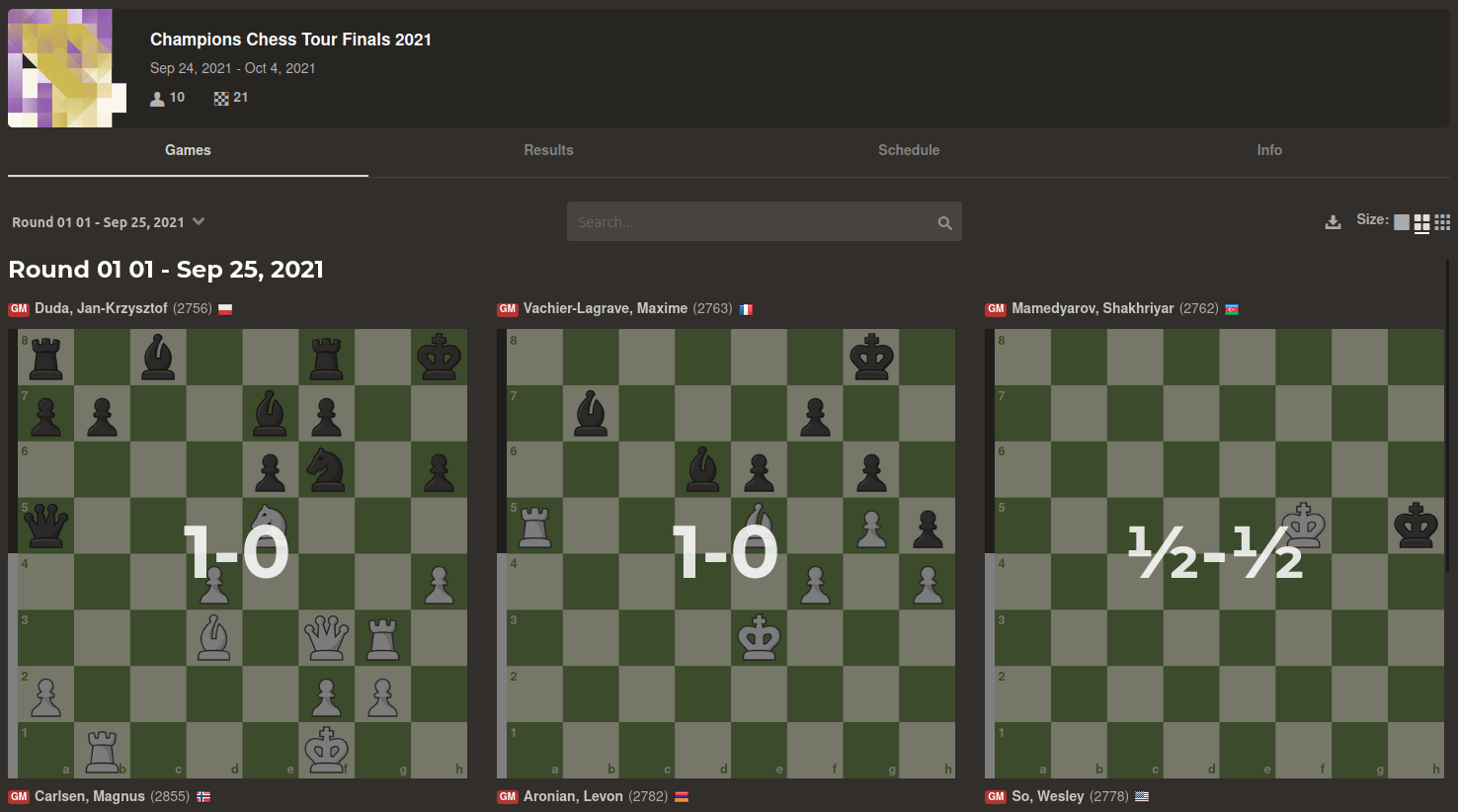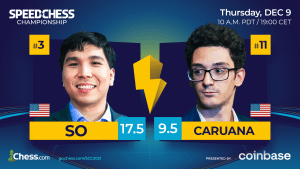
Champions Chess Tour Finals Day 1: Carlsen Impressive In Opener
The Meltwater Champions Chess Tour Finals began on Saturday. The format is a round-robin event with 10 super-GM participants, namely Magnus Carlsen, Wesley So, Levon Aronian, Anish Giri, Teimour Radjabov, Vladislav Artemiev, Hikaru Nakamura, Maxime Vachier-Lagrave, Shakhriyar Mamedyarov, and Jan-Krzysztof Duda.
This is a tournament with a mixed time format: each day players compete in a match of four rapid games. However, if a match is tied, the winner is determined in a blitz playoff; then, if needed, in an armageddon game.
Let's see what happened on the first day.
The games of the Champions Chess Tour Finals can be found here as part of our live events platform.

Carlsen-Duda
World Champion Carlsen played the winner of last year's World Cup, Duda.
As many chess fans know, Duda was the player who knocked Carlsen out in the World Cup's semifinals by winning a gorgeous game with the black pieces. Overall, Duda has had a terrific record versus the world champion as of late. Of course, with Carlsen being as competitive as he is, a very intense match was expected.
In the first game of the match, the Norwegian superstar went on to win an absolutely beautiful miniature in just 18 moves, as analyzed by GM Dejan Bojkov.
Full analysis coming soon.
In the next round, Poland's best player conducted the first part of the game extremely well. In a Benoni/KID pawn structure, he outplayed Carlsen and had a winning position by move 20. However, on move 29, he made a bad decision, which immediately destroyed his strong position and resulted in Carlsen winning another game.
At this point, of course, the match was pretty much over: Duda had to win two in a row to get to the tiebreaks.
In the third game, Magnus, who needed to draw with the white pieces, chose the peaceful Moscow Variation of the Sicilian Defense, played a very solid game, got a small advantage, and forced a repetition on move 19.
Of course, since it's a four-game match, scoring 2.5/4 is enough to win, so with the score 2.5-0.5, the match ended immediately. A great performance by Carlsen, who played a brilliant game in round one and then saved a very bad position in the next game.
So-Mamedyarov
So has had an amazing year in online chess, having won a number of challenging tournaments. Perhaps it is not an exaggeration to say he is currently any online tournament's top favorite after Carlsen. On day one of this event, he faced Mamedyarov.
In the first round, So had the white pieces, and the Azeri super-grandmaster chose the ultra-complex and ambitious Four Knights Sicilian. White had a slight advantage but then erred, and Black started pressing. However, with careful defense, the American star managed to neutralize his opponent's initiative and draw the game.
For the next game, So had the black pieces. After 1.d4, he chose one of his benchmark drawish variations, the Semi-Tarrasch line with 5...cxd4. If you are interested in seeing more games in that line, you can find a report on the semifinals of the Pro Chess League, where the game Vidit-So saw the same variation.
White had a slight advantage, which So carefully neutralized. The game was going to a draw; however, Mamedyarov lost the thread, and after a few bad decisions in a row, ended up losing right away. As a result, So took the lead: 1.5-0.5.
In round three, the American player had the white pieces again. Leading the match, he did not need to take too many risks. Instead of repeating the choice in game one, he forced Mamedyarov in the Sveshnikov variation of the Sicilian Defense. White played very solid chess, at one point was significantly better, but Black defended: another draw, and a score of 2-1 in the match so far.
As a result, the Azeri grandmaster absolutely needed to win the last game, so he chose an ultra-aggressive variation with the early push of his g-pawn. But So defended very carefully, kept the game under control at all times, and won, even though he needed only a draw for the overall victory. That's how the day ended with a 3-1 victory for So, now one of the leaders of the event.
Aronian-MVL
In this match, round one started with Armenia's best player taking the lead after winning a very instructive game as White in the Grunfeld Defense. He had the initiative and then converted his material advantage. You can learn a lot from analyzing this game.
The next two rounds ended in draws, and now MVL needed to win the final one to guarantee tiebreaks. The position was very equal and drawish until move 41, when Aronian made a decisive mistake, allowing MVL to score the full point.
Unlike in the two previous matches discussed above, this one needed a playoff to determine the winner. MVL won the first blitz game, but Aronian managed to come back in the second one, and the match was taken to the armageddon. Aronian had the white pieces and needed to win; however, MVL went on to win the game and the match with a total score of 4-3.
Rajdabov-Artemiev
Both Artemiev and Rajdabov are known for their very solid styles. This match was likely going to be one where a win would pretty much determine the winner, and that's exactly what happened.
The first four rapid games were drawn, and the match was taken to the blitz playoffs.
In the first blitz game, the typical symmetrical g3-Grunfeld position was equal for a long time. At one point, Rajdabov had the advantage, but then it slipped away. In a matter of just a few moves, the Russian player developed a decisive attack and scored his first win. Let's see how that happened.
Needing just a draw in the second blitz game, Artemiev managed to achieve just that in another very even and drawish battle and went on to win the match and join the lead. Patience wins!
Giri-Nakamura
In the first game of the match, Nakamura outplayed Giri with the black pieces in a slightly better endgame that occurred in the 4.d3 Anti-Berlin and scored a full point.
The second game was drawn. In the third, a bit of drama happened: in a position that was somewhere between equality and a slight advantage to White, Nakamura, by misclicking or premoving or for whatever other reason, hung a piece to a one-move tactic. He then tried to play on for a couple of moves, but of course, Giri converted his extra piece easily, equalizing the score. The fourth game was also drawn, and the match was taken to the blitz playoff.
The famous American streamer has been considered one of the biggest favorites of any blitz event. However, this time, Giri turned out stronger. Having drawn the first blitz game, he obtained a very advantageous position in round two. Perhaps it is fair to call it technically winning, even though Black still had a lot of potential to resist. But at that point, Nakamura took a pawn and blundered a fork, losing in one move his rook, the game, and the match. It was definitely a dramatic match, as usually Nakamura blunders less in a year than he did within those six games. Anyway, Giri is now another co-leader of the tournament.
All games day 1
The $300,000 Meltwater Champions Chess Tour Finals take place September 25-October 4, 2021 on chess24. The format is a 10-player round-robin; in each round the players play a four-game rapid match. The time control is 15 minutes for the whole game plus a 10-second increment.


